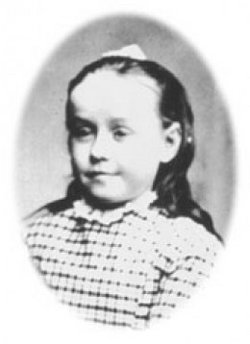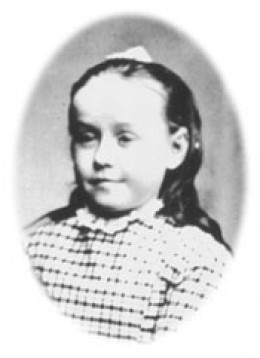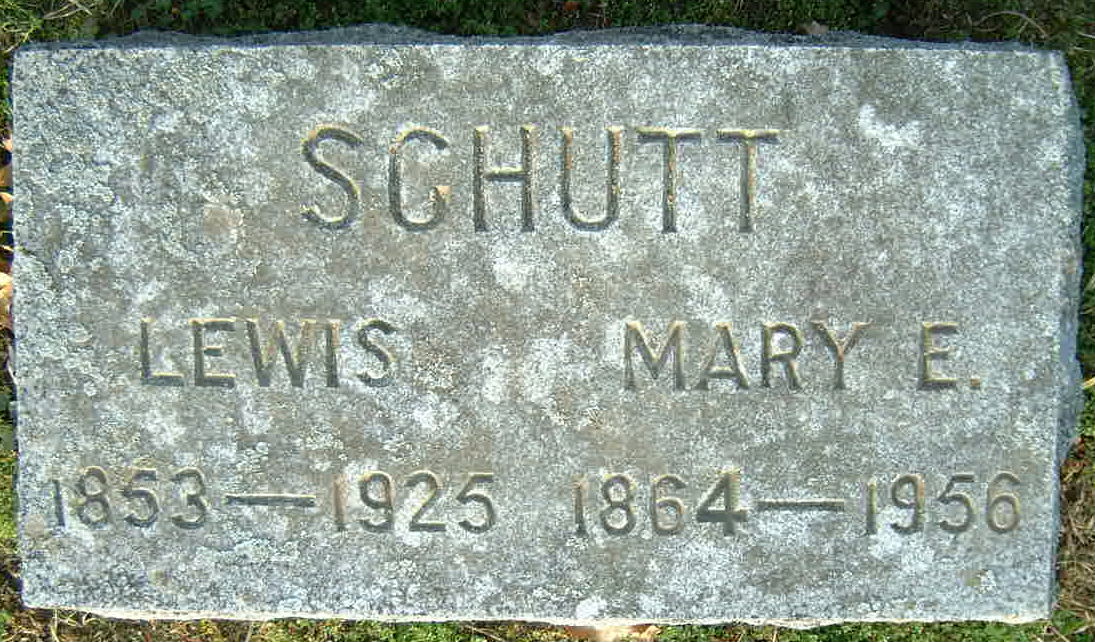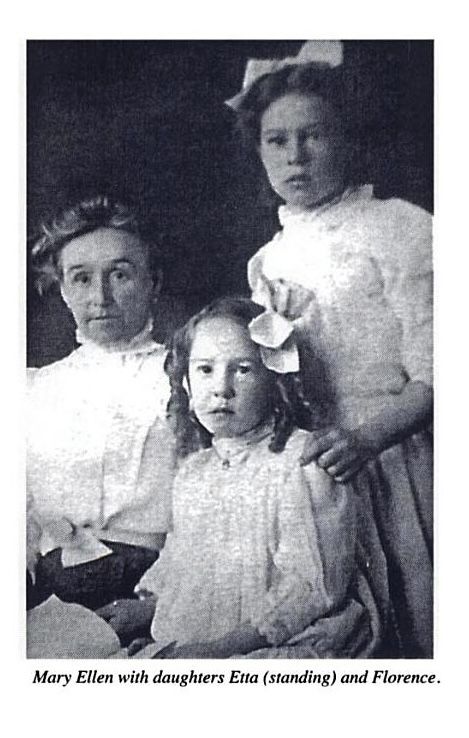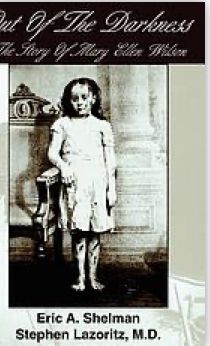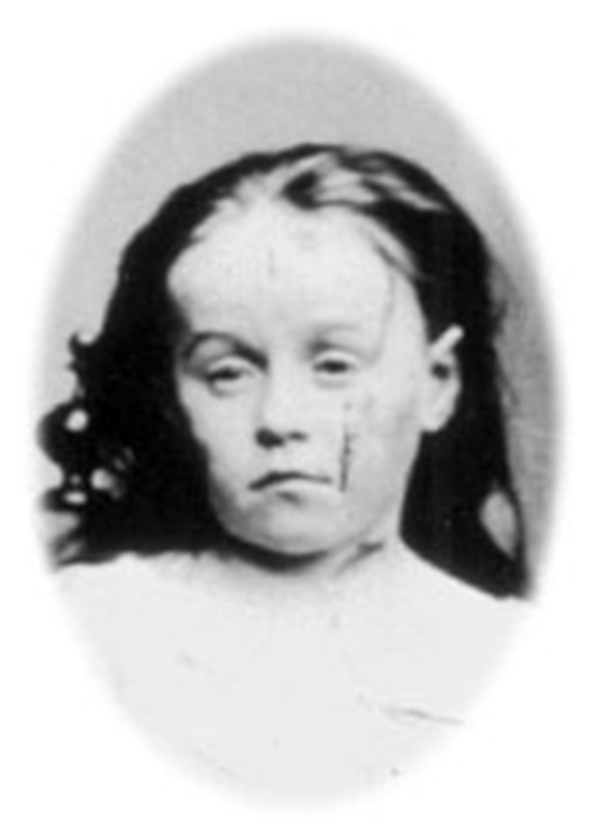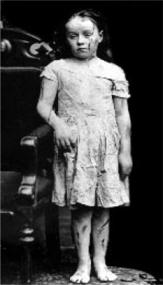First child abuse case to be heard and decided in a court of law. Mary Ellen was also known later by her adoptive name Mary Ellen McCormack; she was the only child of Thomas Wilson and Frances "Fanny" Connor Wilson in the Hell's Kitchen section of New York. When she was about six months old, her father died in the Second Battle of Cold Harbor in Virginia during the American Civil War, leaving her mother to care for her alone.
As a widow of a Union soldier Frances received $2 weekly but it was not enough to support herself and her child. She became a laundress and boarded the infant Mary Ellen out, a common practice in those days. When her mother lost her job she was unable to pay for daughter's care and turned her over to an orphanage on Blackwells Island Penitentiary, now Roosevelt Island, New York.
A short time later, her mother returned to visit her but she was told by the caretaker that the two-year-old toddler had died. A Manhattan couple, Mary and Thomas McCormack, had adopted her [illegally] from the Department of Charities and within a short time her new father died unexpectedly. Thomas had signed a document stating that she would become an indentured servant until the age of eighteen.
Grief stricken and overburdened, the mother began abusing her almost immediately. As soon as she was capable enough, she was forced to clean dishes, do sewing and other chores by her adoptive mother. She was never allowed to play, look out the windows or been on the street in front of her home. Her clothing was the barest minimum and she remarked once that she had never worn flannel. There were articles of clothing in the room: a dress, a skirt and stockings, but she was never allowed to wear them and she had no shoes.
At this time Mary McCormack remarried Francis Connolly. When he would leave for work in the mornings, her adoptive mother would beat her for as long as fifteen minutes daily, or until the mother grew tired. On Easter Sunday the Connollys left her alone and locked in her room until after dark. Several neighbors heard crying, whimpering and sounds that could only be abuse of a child. Mary Smitt's home was next to the McCormack home and she was able to hear crying, whimpering, wailing and what she thought were whippings. Since she was an invalid and unable, she asked mission worker Etta Wheeler to investigate.
Seeing the bruises and scars, Wheeler sought police help but was turned away because there were no child protection laws at that time and the state could not get involved. Several people noticed the child but they were told they could not interfere. Mary Connolly once told neighbors that her husband wanted to put the child in an asylum but they were given a "fortune" to keep the child.
Etta's progress was slow; angered and inspired, Wheeler sought the help of Henry Bergh, the founder of the ASPCA. Bergh's plan was to use the laws that protect animals to stop the cruel treatment of her. He hired lawyer Elbridge Gerry, the grandson of Governor Elbridge Gerry [of gerrymandering fame] of Massachusetts, who took the case to the New York State Supreme Court. He sent a New York Society for the Prevention of Cruelty To Animals worker posing as a census taker to check on her condition and be a witness.
Once the evidence had been obtained it took only 48 hours to remove her from the home. When carried into the courtroom wrapped in a blanket on April 10, 1874, ten-year-old Mary Ellen was hysterical and feared her mother would punish her. She held a peppermint stick that police officers gave her to calm her.
During the trial Judge Abraham Lawrence brought her into the courtroom and listened to her testimony that was published in the next day's New York Times:
"My father and mother are both dead. I don‘t know how old I am. I have no recollection of a time when I did not live with the Connollys. Mamma has been in the habit of whipping and beating me almost every day. She used to whip me with a twisted whip - a rawhide." She also reported specific injuries she received from Mary McCormack, "I have now on my head two black-and-blue marks which were made by Mamma with the whip, and a cut on the left side of my forehead which was made by a pair of scissors in Mamma's hand; she struck me with the scissors and cut me. I never dared speak to anybody, because if I did I would get whipped."
Investigations and testimony revealed her abuse: malnourishment, confinement in a dark and locked room, ill clothed in winter, made to sleep on a carpet on the floor, forbidden to go outdoors except at night and only in her own yard, beaten with a cane and a whip of twisted leather.
On April 21, 1874 after twenty minutes of deliberation Mary Connolly was found guilty of felony assault and battery and sentenced to one year at hard labor in the penitentiary. The court was fully satisfied that she had been guilty of wanton cruelty. Recorder Hackett addressing Mary Connolly said he would have preferred the higher charge not only as punishment to her but as a warning to others.
Many people from varying stations in life expressed concern for her with one newspaper article saying, "She is a bright little girl with features indicating unusual mental capacity, but with a careworn, stunted and prematurely old look."
After the case she was sent to live in a home for delinquent teenagers but that did not last. Etta Wheeler took it upon herself to raise Mary Ellen with her, her mother and sister in North Chili, New York. At the age of 24 she married widower Lewis [Louis] Schutt with his three children and she went on to have two daughters of her own, Etta, named after Etta Wheeler, and Florence.
She had lived in such an abnormal environment that she had to be acclimated to her new life conditions. She had to learn how to walk on grass because she had never walked on uneven surfaces like rocks, grass and pavement. She had never seen grass, flowers or trees. She did not know how to play and never had a toy. Living with Etta and her family, she had to learn manners and right and wrong of civilized life. She also learned about God through religious instruction. Mary Ellen lived a relatively normal, uneventful life afterward and rarely spoke of the early years of abuse. She attended one American Humane Association conference in 1913 and watched as Etta spoke about child protection and her case. Many admired Mary Ellen and held her in high esteem and by all accounts she lived quite happily to the age of 92.
Her landmark case led Bergh, Gerry and John D. Wright to found the New York Society For the Prevention Of Cruelty To Children (NYSPCC), the first of its kind in the world with more to soon follow. Mary Ellen's case was the catalyst that opened the door to change in the field of child protection. (Bio by: Jackie Saulmon Ramirez)
____________________________________________________________
Mary Ellen's youngest daughter was Florence Schutt Brasser born May 13, 1901 and died on April 4, 1992.
Mary Ellen's oldest daughter was Etta Spencer Schutt Pease. She was named Etta after Etta Wheeler who rescued her. The middle name Spencer is from Darius and Elizabeth Spencer, Etta Wheeler's sister and brother-in-law who Mary Ellen lived with from 1875 until her marriage at 24 in 1888.
First child abuse case to be heard and decided in a court of law. Mary Ellen was also known later by her adoptive name Mary Ellen McCormack; she was the only child of Thomas Wilson and Frances "Fanny" Connor Wilson in the Hell's Kitchen section of New York. When she was about six months old, her father died in the Second Battle of Cold Harbor in Virginia during the American Civil War, leaving her mother to care for her alone.
As a widow of a Union soldier Frances received $2 weekly but it was not enough to support herself and her child. She became a laundress and boarded the infant Mary Ellen out, a common practice in those days. When her mother lost her job she was unable to pay for daughter's care and turned her over to an orphanage on Blackwells Island Penitentiary, now Roosevelt Island, New York.
A short time later, her mother returned to visit her but she was told by the caretaker that the two-year-old toddler had died. A Manhattan couple, Mary and Thomas McCormack, had adopted her [illegally] from the Department of Charities and within a short time her new father died unexpectedly. Thomas had signed a document stating that she would become an indentured servant until the age of eighteen.
Grief stricken and overburdened, the mother began abusing her almost immediately. As soon as she was capable enough, she was forced to clean dishes, do sewing and other chores by her adoptive mother. She was never allowed to play, look out the windows or been on the street in front of her home. Her clothing was the barest minimum and she remarked once that she had never worn flannel. There were articles of clothing in the room: a dress, a skirt and stockings, but she was never allowed to wear them and she had no shoes.
At this time Mary McCormack remarried Francis Connolly. When he would leave for work in the mornings, her adoptive mother would beat her for as long as fifteen minutes daily, or until the mother grew tired. On Easter Sunday the Connollys left her alone and locked in her room until after dark. Several neighbors heard crying, whimpering and sounds that could only be abuse of a child. Mary Smitt's home was next to the McCormack home and she was able to hear crying, whimpering, wailing and what she thought were whippings. Since she was an invalid and unable, she asked mission worker Etta Wheeler to investigate.
Seeing the bruises and scars, Wheeler sought police help but was turned away because there were no child protection laws at that time and the state could not get involved. Several people noticed the child but they were told they could not interfere. Mary Connolly once told neighbors that her husband wanted to put the child in an asylum but they were given a "fortune" to keep the child.
Etta's progress was slow; angered and inspired, Wheeler sought the help of Henry Bergh, the founder of the ASPCA. Bergh's plan was to use the laws that protect animals to stop the cruel treatment of her. He hired lawyer Elbridge Gerry, the grandson of Governor Elbridge Gerry [of gerrymandering fame] of Massachusetts, who took the case to the New York State Supreme Court. He sent a New York Society for the Prevention of Cruelty To Animals worker posing as a census taker to check on her condition and be a witness.
Once the evidence had been obtained it took only 48 hours to remove her from the home. When carried into the courtroom wrapped in a blanket on April 10, 1874, ten-year-old Mary Ellen was hysterical and feared her mother would punish her. She held a peppermint stick that police officers gave her to calm her.
During the trial Judge Abraham Lawrence brought her into the courtroom and listened to her testimony that was published in the next day's New York Times:
"My father and mother are both dead. I don‘t know how old I am. I have no recollection of a time when I did not live with the Connollys. Mamma has been in the habit of whipping and beating me almost every day. She used to whip me with a twisted whip - a rawhide." She also reported specific injuries she received from Mary McCormack, "I have now on my head two black-and-blue marks which were made by Mamma with the whip, and a cut on the left side of my forehead which was made by a pair of scissors in Mamma's hand; she struck me with the scissors and cut me. I never dared speak to anybody, because if I did I would get whipped."
Investigations and testimony revealed her abuse: malnourishment, confinement in a dark and locked room, ill clothed in winter, made to sleep on a carpet on the floor, forbidden to go outdoors except at night and only in her own yard, beaten with a cane and a whip of twisted leather.
On April 21, 1874 after twenty minutes of deliberation Mary Connolly was found guilty of felony assault and battery and sentenced to one year at hard labor in the penitentiary. The court was fully satisfied that she had been guilty of wanton cruelty. Recorder Hackett addressing Mary Connolly said he would have preferred the higher charge not only as punishment to her but as a warning to others.
Many people from varying stations in life expressed concern for her with one newspaper article saying, "She is a bright little girl with features indicating unusual mental capacity, but with a careworn, stunted and prematurely old look."
After the case she was sent to live in a home for delinquent teenagers but that did not last. Etta Wheeler took it upon herself to raise Mary Ellen with her, her mother and sister in North Chili, New York. At the age of 24 she married widower Lewis [Louis] Schutt with his three children and she went on to have two daughters of her own, Etta, named after Etta Wheeler, and Florence.
She had lived in such an abnormal environment that she had to be acclimated to her new life conditions. She had to learn how to walk on grass because she had never walked on uneven surfaces like rocks, grass and pavement. She had never seen grass, flowers or trees. She did not know how to play and never had a toy. Living with Etta and her family, she had to learn manners and right and wrong of civilized life. She also learned about God through religious instruction. Mary Ellen lived a relatively normal, uneventful life afterward and rarely spoke of the early years of abuse. She attended one American Humane Association conference in 1913 and watched as Etta spoke about child protection and her case. Many admired Mary Ellen and held her in high esteem and by all accounts she lived quite happily to the age of 92.
Her landmark case led Bergh, Gerry and John D. Wright to found the New York Society For the Prevention Of Cruelty To Children (NYSPCC), the first of its kind in the world with more to soon follow. Mary Ellen's case was the catalyst that opened the door to change in the field of child protection. (Bio by: Jackie Saulmon Ramirez)
____________________________________________________________
Mary Ellen's youngest daughter was Florence Schutt Brasser born May 13, 1901 and died on April 4, 1992.
Mary Ellen's oldest daughter was Etta Spencer Schutt Pease. She was named Etta after Etta Wheeler who rescued her. The middle name Spencer is from Darius and Elizabeth Spencer, Etta Wheeler's sister and brother-in-law who Mary Ellen lived with from 1875 until her marriage at 24 in 1888.
